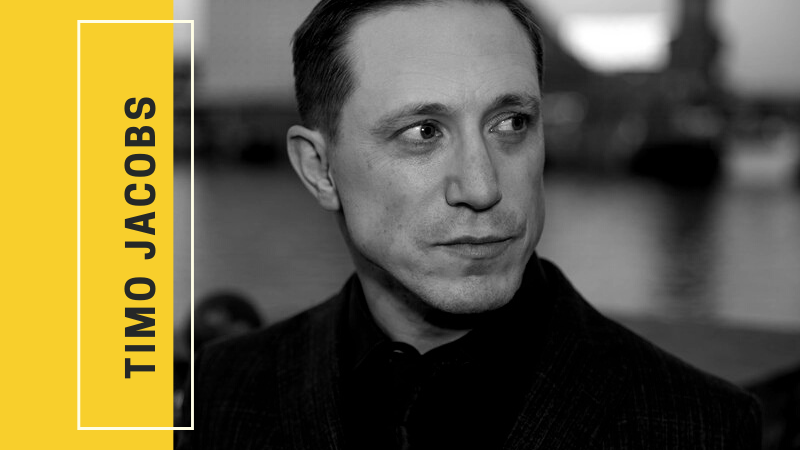Timo Jacobs
1.Your project takes a part in our festival. What is your project
about?
Charlie
Schwarzer’s great career in comedy just won’t take off as planned
and on top of that, the love of his life, Emilie, has just left him
and gets involved in a serious car accident. But does this mean ‘game
over’ for Charlie? The answer is ‘no’. His motto is “Stand
Up!”
2.
What were your requirements for actors to take a part of your film?
You
have to be able to really listen, you have to be in tune with your
instincts - and empathy too would be a good tool to have. And finally
you gotta show up!
3.
How did you communicate with the cameraman?
Using
the script, the locations, the characters, the lighting and the
characters’ psychology - plus the inner driven motor of the story.
The right screenplay has a certain sound that tells you the most.
4.
What locations did you choose for your project? And why?
Mostly
of the places I already knew and I’d been to before - or they were
places that I’d been searching for a while in my mind and in
pictures. I like to imagine the set up early enough in the production
process, but I also like to be able to adapt and to adjust to new
locations in case we need to. It’s just a process of drama at work,
which is really complex if you sit down and try to analyse it – and
I would also explain it differently depending who I’m talking to.
5.
Why should distributors buy your film?
Because
they are smart?
6.
What expression elements did you use in your project? How would you
characterize your work?
I did
that but more unconsciously, or at least the result has to seem as if
it is made without any certain ambitions. It’s not my role to
characterize my work, I’m just the creator, which means I go with
the flow and if it doesn’t work out, then I’ve got to make it
work out.
7.
At what festivals have you had success? Has the film already
premiered? If so, where?
The
movie has been shown around the world at various international film
festivals and has won 46 awards so far. Because of the tough covid
restrictions and the implications of covid for cinemas everywhere it
was impossible to plan an official start for the movie, so we decided
to go for the festivals.
8.
What motivated you to become a filmmaker?
I’ve
been performing as an actor in many independent films over the years,
and that makes you think like that. When I first started I was
working with an old movie veteran called Klaus Lemke. It was funny
and really interesting to watch him at work and to be a part of the
movie-making process. He was really living it - and he still does,
despite now being 80 years old.
9.
Which movies are your favorites? And why?
I’ll
give you my current top eleven and you’ll ask ‘why’? And my
answer would be ‘because they show us the struggles in a poetic
way, and what they all have in common is that they tell us the things
which we constantly ignore, and that we are getting nowhere without
patience, without being kind to each other and learn to enjoy some
kind of pleasure in letting go.’ A good film teaches you how to fly
and fall at the same time - haha.
Nomadland / Chloé Zhao
Beasts of the Southern Wild / Ben Zeitlin
Birdman / Alejandro González Iñárritu
There will be Blood / Paul Thomas’s Anderson
Swiss Army man / Daniel Kwan
La Danza de Realidad / Alejandro Jodorowsky
Being John Malkovitch / Spike Jonze
Big Fish / Tim Burton
On the Waterfront / Elia Kazan
La Strada / Federico Fellini
Citizen Kane / Orson Welles
10.
What topics do you like to deal with in your work?
I
don’t put myself in a category. That would mean limiting myself.
I’m no big fan of setting limits for myself, and the sky is getting
cloudy anyway. We all strive for love, respect, and self- sufficiency
and once you go to work you have to see within your personal story
and within the bigger story, how to get there! The topics just do not
matter. That doesn’t make sense? See, that’s how easy drama
works.
11.
What genre do you like to shoot and why?
Life,
Death and Laughter - or fire, water, ice? Period.
12.
What project would you like to shoot one day, what would it be about?
What
person will I be one day, and what will he be about?
13.
How has COVID affected your film life?
Right
when it all started I got inspired and I just thought ‘the streets
are empty like never before’ and I started an apocalyptic
mockumentary project about crises and solutions called ‘The dance
around the Black hole.’
14.
What do you do if you're not thinking about a movie? What are your
hobbies?
That’s
a funny question.
15.
What projects do you plan to shoot in the future?
I’ve
been juggling some ideas around in my head and starting to meet and
talk to friends and people who I’d like to work with. Filmmaking is
a process that needs certain tricks. One trick is to keep your mouth
shut until you really need to talk. So I’d like to finish with a
Joe Strummer Quote: “the future is unwritten.”

